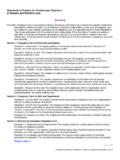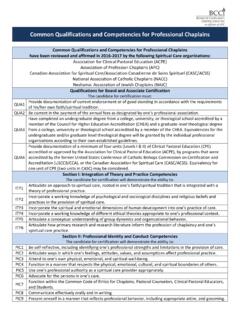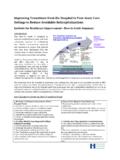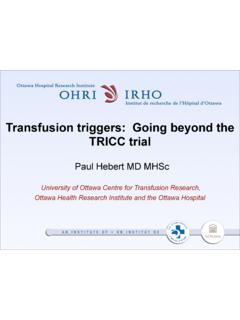Transcription of FACT, A Chaplain’s Tool for Assessing Spiritual Needs in ...
1 Chaplaincy Today e-Journal of the Association of Professional Chaplains Volume 28 Number 1 Spring/Summer 2012 25 FACT, A Chaplain s tool for Assessing Spiritual Needs in an acute care Setting Mark LaRocca-Pitts BCC Spiritual histories constitute a genre and are distinct from Spiritual screens and Spiritual assessments. Five Spiritual history tools (CSI-MEMO, FICA, HOPE, FAITH and SPIRIT) are presented as examples of this genre. In comparison, FACT is not a Spiritual history tool . Instead, FACT is a Spiritual assessment tool designed for chaplaincy use in an acute care setting.
2 Other health care clinicians interested in Spiritual care may also find this tool helpful. A reviewer for the Australian Journal of Pastoral care and Health (AJPCH) commented on a previous article by Mark LaRocca-Pitts as follows: [T]itling FACT as a Spiritual history tool seems unfortunate. FACT does not gather a history in the way a physician gathers a medical history. Rather, it provides information for an assessment, upon which an intervention might be planned. In response, this article originally appeared in AJPCH (3:2, December 2009) under the title In FACT, Chaplains Have a Spiritual Assessment tool and is reprinted with permission.
3 (Editor s note: The discussion of how best to gather information in order to meet patients Spiritual Needs is ongoing. Comments or brief articles related to this topic, including how histories, screens and/or assessments are documented in the patient s medical record, are invited. Submit via e-mail to HEALTH care CHAPLAINCY CONTINUES TO DEVELOP as a clinical profession. Competencies for certification, professional codes of ethics and standards of practices are part of the professional chaplain s landscape as evidenced by the Spiritual care A new language for this new landscape is needed.)
4 Spiritual assessment is part of this new language and a professional chaplain Needs to speak it. Within this broad category called Spiritual assessment, distinctions may be made, such as the differences among a Spiritual screen, a Spiritual history, and a Spiritual assessment. This article will describe these differences including a discussion concerning the use of a Spiritual history. Furthermore, the category called Spiritual history now constitutes a genre. This article will delineate the chief characteristics of this genre and provide examples.
5 Against this backdrop, we will evaluate whether FACT qualifies as a Spiritual history. Spiritual screens, histories and assessments A Spiritual screen, a Spiritual history and a Spiritual assessment are distinct in form and Spiritual screen A Spiritual screen is the shortest and generally uses one or two static questions aimed at determining the patient s faith affiliation and whether the patient has special religious and/or cultural Needs , such as diet, observances and/or restrictions, , blood products. A Spiritual screen obtains information that rarely changes in the course of a patient s admission.
6 Mark LaRocca-Pitts PhD BCC serves as staff chaplain at Crossroads Hospice of Atlanta, Tucker, GA. He is endorsed by the United Methodist Church. Chaplaincy Today e-Journal of the Association of Professional Chaplains Volume 28 Number 1 Spring/Summer 2012 26 Generally, a clerk performs the Spiritual screen during registration, though sometimes it forms part of a nursing admission form. Chaplaincy departments are constantly seeking the perfect one or two questions that will generate an appropriate chaplaincy Spiritual history A Spiritual history is more involved than a screen.
7 Its questions engage the dynamics of the patient s faith or Spiritual experience identifying specific ways in which a patient s religious [or Spiritual ] life, both past and present, impact the patient s medical care . 4 Not only are the questions dynamic, but also the answers in that they may change during the course of a patient s hospitalization. A patient admitted with pneumonia may have sufficient Spiritual resources to cope effectively, but if diagnostic procedures reveal the pneumonia is an opportunistic infection related to the patient s until-then-unknown HIV+ status, then the patient may find that he/she has insufficient Spiritual resources to cope effectively.
8 Just as the medical history changes to reflect this, so may the Spiritual history. A Spiritual history may need to be performed more than once during a single hospitalization and periodically during the progression of a disease. A physician, nurse or chaplain may take a Spiritual history and place salient information in the medical Furthermore, whereas a Spiritual screen is limited in its form and function, , one or two static questions asked at the time of admission, the Spiritual history may be used in various settings and at various times. A Spiritual history may be administered either as a formal checklist or as an informal one.
9 When used as a formal checklist, it easily forms part of a larger, more in-depth assessment, such as a physician s history and physical, a nurse s admission assessment, or a professional chaplain s Spiritual assessment. A Spiritual history functions like a social history, identifying a need that may result in a referral. When used as an informal checklist, it serves as a tacit guide around which a clinician may organize a conversation in order to obtain clinically relevant information pertaining to a patient s Spiritual well-being. This latter use fits well within the ongoing relationship a clinician develops with a patient.
10 If and when significant changes occur in the patient s treatment process or if and when a patient initiates the topic of faith, the clinician may use that opportunity to reevaluate the patient s Spiritual well-being by using what appears to be casual conversation. When taking a Spiritual history, a few guidelines are recommended. A clinician should always show respect for the patients expressions of their faith or beliefs, even if the clinician s differs radically. Imposing one s faith on another is never the goal of a Spiritual history. A Spiritual history focuses less on what individuals believe and more on how their faith and/or beliefs function to help them cope positively with their illness crisis.












